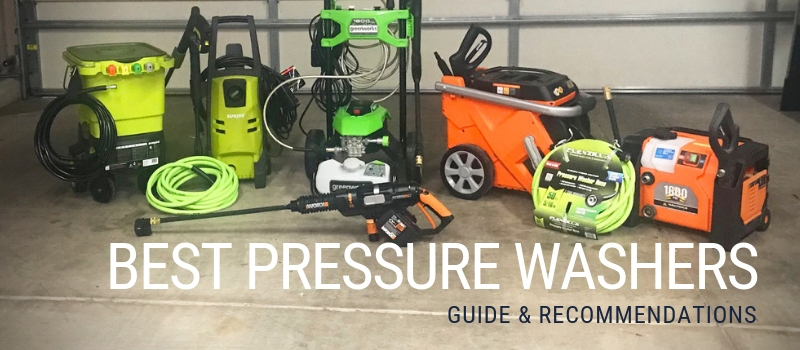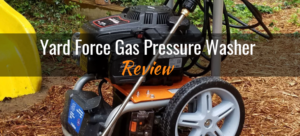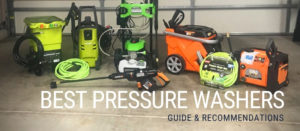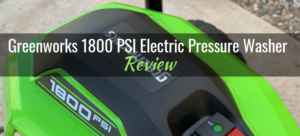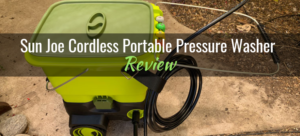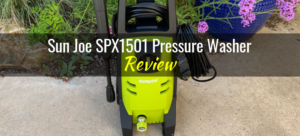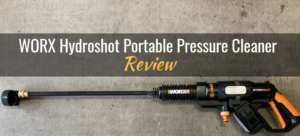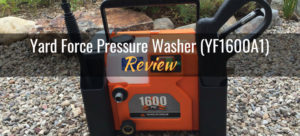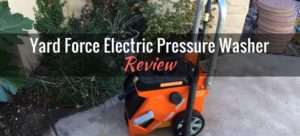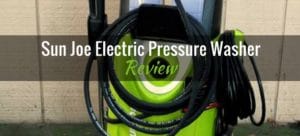Best Electric & Cordless Pressure Washers: Guide & Recommendations
We independently evaluate all recommended products and services. If you click on links we provide, we may receive compensation.
Pressure washers. How do they work? How do I choose between a gas, electric, or cordless pressure washer? What's the difference between a pressure washer, power washer, and power cleaner? Why are there so many different nozzles and what are they used for? What about PSI and flow rate (GPM)?
I answer those questions - and more - in this article. Plus, I share my top picks based on extensive testing of different brands and models.
The focus of this article is primarily on “consumer-grade” powerwashers (primarily electric). These machines offer great value at a reasonable price point, are generally used only occasionally, and some even have PSI’s similar to semi-commercial and professional units, just without the price tag (or the quality parts that make up the heavier duty units).
TYPES OF Pressure Washers
There are three basic types of pressure washers.
- Units driven by a gasoline engine
- Plug-in (electric) units operating at 120V, and
- Cordless machines run by a battery, usually Lithium-Ion (Li-Ion).
Each type of pressure washer has its advantages and disadvantages, and you can go crazy trying to figure out all the pros and cons to choose the best pressure washer for your needs. I recommend applying Pareto’s rule by asking yourself which machine will accomplish 80% of your tasks with only 20% of your effort. That should give you a good starting point.
Basic Pressure Washer Terminology
PSI – Pounds per Square Inch
This is the amount of force that the water emitted from the power washer applies to a surface. Ideally, you want a unit that will be powerful enough to displace one material from another. For example, is the PSI high enough to strip paint off your house, tar from your walkway, mold from concrete, or grime and dirt from your car? The higher the PSI, the more aggressive a pressure washer is.
GPM – Gallons Per Minute (also known as Flow Rate)
Think for a moment about Niagara Falls, which produces about 440,380,904 GPM. This is a gargantuan number. As all that water plunges over the edge, it falls 160 feet to the boulders below, slowly eroding them into grains of sand. Now think about the water trickling over the edge of a small decorative fountain. It has a fraction of Niagara’s flow rate and barely makes a dent in the ground below.
If I wanted to clean (or pulverize!) something fast, I’d use Niagara vs the trickling fountain. It's the same with a pressure washer. If you want to clean a larger surface area in less time, you need a higher GPM or flow rate.
Anatomy of a Pressure Washer
This article focuses on cold water pressure washers. These are typically hooked up to a garden hose where water temperatures are below 1040 F. There are pressure washer units that use hot water but these are reserved for commercial use. It’s very important not to run hot water through a cold water pressure washer as it will damage the high pressure pump.
With that out of the way, lets talk about what makes up a cold water pressure washer:
- It has a high pressure water pump.
- There’s an inlet to attach the unit to a water source, typically a garden hose. Some of the new cordless, battery-powered units draw water from a bucket instead of (or in addition to) a hose hookup.
- The pump is run by either common house voltage (120V), a gasoline engine, or (relatively new to the market) a li-ion battery.
- The pump can be hand held (luggable) or built into a unit that has wheels for dragging it to the jobsite.
- Many units have on-board detergent tanks or a separate soap dispenser.
- It has a high-pressure hose that goes from the water pump to the spray wand (the “gun” that holds the nozzle).
- Typically, a pressure washer comes with an array of different spray pattern nozzles (usually 00, 150, 250, and 400) and may also include a soap dispensing nozzle.
- It might have a “turbo” nozzle included (more about that later).
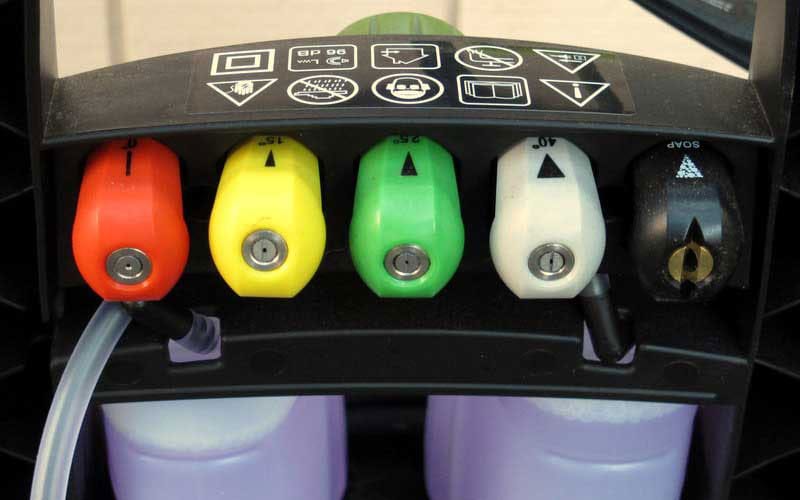
About Pressure Washer Spray Nozzles
With the exception of “turbo” nozzles, most consumer grade pressure washers on the market today include a selection of nozzles in their kit. Each nozzle has a different function. These include:
- 00 is a pencil-thin spray that creates intense high pressure. It is used for reaching into tight crevices where a highly concentrated fine stream of water is required. It’s also excellent for removing things like tar, baked-on mud, crud from the underside of a lawnmower deck, grease stains and for reaching high places like the overhangs on the second story of your house.
- 150 is ideal for stripping surfaces. Use it on everything from paint to mold, from rust on steel to oil/grease stains.
- 250 makes a good nozzle for cleaning the side of your house, patios, decks and even driveways.
- 400 nozzles are typically used to clean windows, outside furniture, automobiles, boats, RV’s, and landscape equipment.
- Soap nozzles are used to dispense detergent to surfaces prior to being pressure washed. These nozzles fit into the end of the spray wand and dispense a very low-pressure stream of detergent.
- Turbo is a nozzle with a spray angle of approx. 00 - 150 that sprays in a rotary vortex pattern at approximately 3,000 RPM’s (revolutions per minute). Because the pencil-thin and narrow cone spray spins at a very high rate of speed, it doesn’t attack a surface like a straight 00 spray nozzle (above). The turbo nozzle’s advantage is that it can cover more area in less time, like 50% less time. Plus, it can be used as a universal, all-purpose nozzle, thereby eliminating the need for the four standard nozzles (except the soap nozzle).
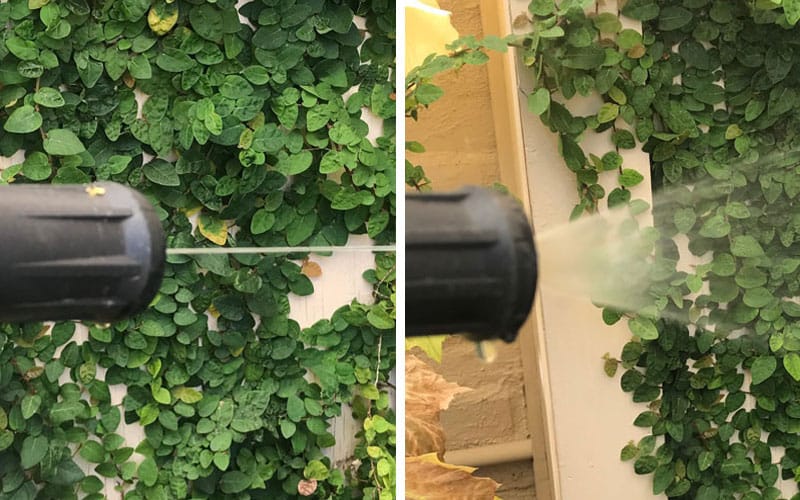
Use the Right Nozzle for the Job
Using the wrong spray nozzles can damage paint finishes on valuable items like boats, cars, and RVs. It's important not to use aggressive spray nozzle patterns on these items. A 400 nozzle is recommended BUT you still have to be careful not to hold the nozzle too close to the vehicle as the clear coat (and even the paint beneath the coating) can be disrupted and ruined.
When power washing a vehicle, it’s often better to first apply a detergent specifically designed for use in pressure washers to help remove the dirt and grime from the vehicle. Then use the pressure washer to gently wash the detergent and dirt away.
Also note that fine angled spray nozzles (00, 150 and sometimes 250) can cause severe damage to wood and other soft surfaces. It’s better to use the recommended nozzle for the specific job.
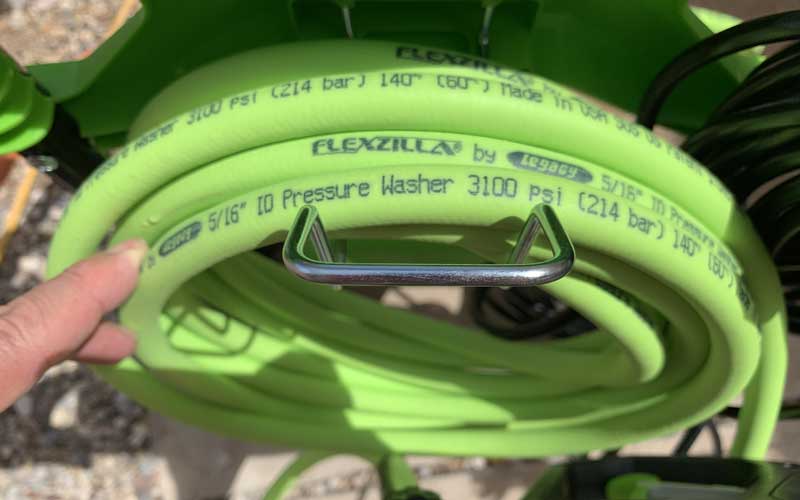
About High-Pressure Hoses
Most pressure washers come standard with a 20-foot, high-pressure hose that hooks the pump to the spray wand. These hoses are usually 1/4" or 5/16" ID (Inside Diameter). The 1/4" ID are typically rated up to 3200 PSI. The 5/16" ID are typically rated from 2700 PSI - 3600 PSI. When buying a pressure washer kit, the manufacture will supply the right ID hose based on the max pressure of the pressure washer. When buying a replacement hose, be sure to purchase the correct ID and PSI rated hose for the unit you own.
If your garden hose has limited range and you need to clean something farther away, then a longer high-pressure hose is the answer. One good option is a high-pressure hose from Flexilla (shown above). These bright green hoses are highly flexible (great for coiling or wrapping around the base unit when you're done spraying) and come in several convenient lengths, including a 50-foot hose that can handle up to 3600 PSI (see above). BUT, I've found that the Flexilla high-pressure hose works best on Greenworks washers (I replace most of the Greenworks high-pressure hoses because they're too thin and they kink easily); on Yard Force and Sun Joe units, it tends to leak.
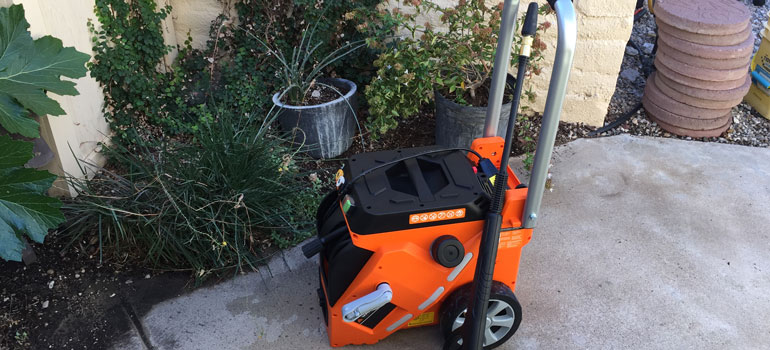
Electric Pressure Washers
If you don't need the more expensive semi-commercial and professional-grade units (and most gardening and weekend warrior landscaping enthusiasts don't), then an electric pressure washer is a great choice.
Major Electric Pressure Washer Brands
We reviewed pressure washers from the main players in the electric (120V & Li-Ion battery powered) pressure washer space (classified as consumer models):
- Yard Force,
- Sun Joe, and
- Greenworks.
Pressure ratings ranged from 500 to 3,200 PSI. Some had individual spray nozzles, some had turbo nozzles and one even had a unique adjustable nozzle that produced virtually any spray pattern from 00 to approx. 450.
What to know about consumer-grade electric power washers
- These units excel at cleaning things like RV’s, cars, BBQ grills, boats, windows, planters and pots, lawnmowers, landscape equipment, outdoor furniture, etc.
- Some of the units I tested are capable of stripping paint, but only at very slow rates (with the exception of one Yard Force gasoline powered 3200 PSI model we reviewed).
- Electric power washers are typically less expensive than gasoline-powered units.
- They can be used indoors (for example, cleaning inside a shower stall, washing a garage floor) without the threat of carbon monoxide.
- On average, these units are capable of delivering PSI’s anywhere from 500 to 3,000+.
- Require very little maintenance.
- Are portable (luggable or towed with a handle and wheels).
- Are quieter than a gasoline engine.
- Are now available in Li-Ion battery powered cordless models.
- Use less GPM of water than semi-commercial and professional-grade units.
- Do not use the same high-quality parts that semi-commercial or professional units use (this is to keep the cost down).
Cleaning Performance
- Performance really depends on flow rate (GPM) and the spray pattern of the nozzle used.
- The closer you hold the nozzle to the work area, the more aggressively it removes dirt, stains, paint, etc.
- As mentioned above, you have to be careful to test different nozzle spray patterns on the surface to be cleaned so that you don’t damage the underlying material.
- The standard kit typically has 4 spray nozzles (usually, 00, 150, 250, 400), giving you plenty of cleaning options.
- A turbo nozzle is a nice-to-have, not a must-have. But I’ve found that they are really handy and can clean up to 50% faster than a conventional single spray angle nozzle.
Recommended Electric Pressure Washers
No products found.
GPW1803 is available at Lowe's.

Cordless Pressure Washers & Power Cleaners
Cordless, battery-powered (Li-Ion) pressure washers are relatively new to the market so there aren't many brands or options available yet.
The real advantage of a cordless washer is that you’re not tethered to an electric cord.
Another advantage is that they often have the ability to draw water from a bucket, rather than relying only on a garden hose as the water source. This makes them extremely portable and great for use in areas where neither a spigot nor an electric outlet are nearby.
To date, I'm seeing models with either one or two li-ion batteries, to a maximum of 40V total. The machines have a decent run time (around 20 minutes for a 40V 4.0 Amp hour battery) on a single battery charge.
However, cordless machines have limited power compared to a corded pressure washer. The units I've seen so far top out at around 800 PSI. In comparison, basic plug-in consumer models typically start out at 1,400 PSI and work up to 2,000 PSI or greater.
If you want a good cleaning machine (not something for stripping paint or other though jobs) that's lightweight, completely untethered, highly maneuverable, and garden hose free, then a cordless battery-powered unit is the way to go. If you need more power and faster cleaning capability, then your best bet is to go with a corded pressure washer.
PRESSURE WASHERS VS. POWER CLEANERS: What Does It Mean?
Whether the manufacturer calls the unit a pressure washer or a pressure cleaner depends largely on the maximum PSI the unit can achieve.
At the low end of the pressure washer classification, you might see cordless machines that reach somewhere in the range of 500 to 800 PSI. Below that are the power cleaners, with a maximum PSI in the 290 to 450 range.
The power cleaners are great for cleaning things like muddy bicycles, cars, boats, windows, washing out gutters, etc. but not for stripping paint or removing soaked in grease stains from a concrete walkway.
Recommended Cordless Power Cleaners / Pressure Washers
No products found.
Gasoline-Powered Pressure Washers
If you want a consumer-grade power washer that will clean faster and with more force, then a gasoline-powered unit will do the trick. They offer greater PSI ranges and faster cleaning rates. They are noisier and usually more expensive than electrics (at least the corded ones), require gasoline, and generate carbon monoxide. But this is the price to you’ll have to pay for a tool that starts to approach a semi-commercial unit.
Safety Considerations
Pressure washers are a serious piece of equipment. They can inflict considerable injury to a person or animal, particularly if the skin is penetrated (“injection hazard”). If that ever happens, seek medical attention immediately! All the manuals explicitly warn against the hazard of having a bystander too close to someone operating the unit. A "safe distance" depends on the power of the unit and which nozzle is in use (stay farther away from someone using a 00 nozzle). One manufacturer's manual recommended a minimum distance of 49 feet (I'm not sure why it's exactly 49 feet).
Other warnings include:
- Read the operator’s manual
- Don’t use plug-in’s or battery-powered units in rainy or wet conditions (shock hazard)
- Wear gloves with a good grip
- Wear ear and eye protection. We recommend Wiley-X safety glasses which come in a wide range of styles, including sunglasses.
- Wear boots or closed-toed shoes with a good anti-slip tread
- For plug-in’s test the GFCI (Ground Fault Circuit Interrupter) to make sure the pressure washer shuts off properly when the test button is pushed.
- Never wash animals with a pressure washer!
How to Choose the Best Pressure Washer for Your Needs
There are many makes and models to choose from (see our recommendations below). Here are some questions to contemplate before you put down your hard-earned money down on a unit:
- How much am I willing to spend?
- What features do I consider must have’s vs. wants? Or are they the same?
- How often will I use it?
- Do I prefer a unit that is luggable or a unit that has wheels?
- Is a compact size important (so that I can easily store it)?
- Do I prefer a unit that has a high-pressure hose reel to retract the hose into the pressure washer or am I ok with coiling the hose and hanging it on the machine?
- How portable do I want this unit to be and should I consider a cordless battery-powered unit that doesn’t require a garden hose to be attached to it?
- What are my toughest cleaning jobs? (this will determine the PSI)
- What drive system makes the most sense for me (gasoline engine, 120V plug-in, battery)?
- Will I use the unit inside? (in which case a gas-powered unit is out of the question)
- Do I need a turbo nozzle?
- Would I rather have an adjustable spray nozzle vs. a fixed set of spray nozzles?
- Is there a particular company/brand that I’m drawn to?
- How good is the manufacturer’s warranty?
- Do I want an integrated detergent tank on the pressure washer frame or is a detergent dispenser at the end of a spray wand adequate?
- Will the machine automatically mix the cleaning detergent without diluting it first?
- Do I value quality (which usually costs more and lasts longer) vs. a cheaper brand that I can replace if it breaks/wears out?
- Do I care if the unit is PWMA (Pressure Washer Manufacturers’ Assoc.) Certified?
Pressure washers (whether gas, electric or battery-powered) are a tool worth investing in if you have any cleaning jobs. All those chores that used to take so long with a garden hose and a standard nozzle are a piece of cake with a pressure washer. Once you own one, you’ll find new uses that you never thought of and will wonder why you didn't get one sooner. With prices starting under $100.00 it’s a great tool to add to your gardening and DIY landscaping tools.
Quick Links
Pressure Washer Reviews
Last update on 2024-04-27 / Affiliate links / Images from Amazon Product Advertising API
Enjoyed This Review?
If you liked this review, please sign up for our email updates with reviews, how-to articles and gardening videos!

